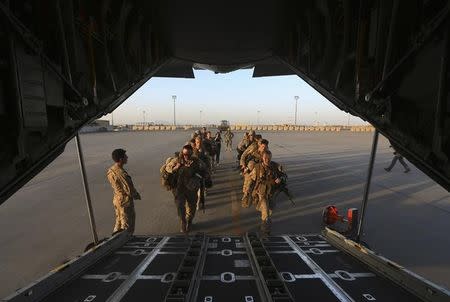U.S. program for Afghan translators in jeopardy as visa supply runs low
WASHINGTON (Reuters) - The U.S. State Department said on Thursday it will soon run out of visas for interpreters and other Afghans who have worked for the U.S. government during the decade and a half that U.S. forces have been engaged in the country.
At least one U.S. senator, Democrat Jeanne Shaheen, said any decision to let the program lapse sends a message to allies in Afghanistan that the United States is not supporting them. She pledged to immediately introduce legislation to provide more visas.
"It's both a moral and practical imperative that Congress right this wrong immediately," Shaheen said in a statement.
Her office said more than 10,000 applicants are still in the process of obtaining visas.
Shaheen and Republican Senator John McCain led a failed effort last year to pass legislation extending to 4,000 more people an existing special immigrant visa program for Afghans who assisted U.S. forces, often risking their lives.
In Afghanistan, where the Taliban has steadily expanded its insurgency and where government forces now control less than 60 percent of the country, there has been deep concern among local contractors working for international forces.
"Most of those working with foreigners are in trouble with their relatives, villagers and even family members," said one translator, who is waiting for medical checks after completing his interview. He declined to give his name because his visa has not yet been granted.
The Taliban has captured biometric equipment to let it identify staff working for the Western-backed government and international forces, heightening the risk for those on official payrolls.
"I cannot go to my home and it has been two years now," the translator said. "If they don't give us a visa, we will be killed or in big trouble, especially once foreigners leave Afghanistan."
The National Defense Authorization Act passed late last year added 1,500 visas to the program, while tightening requirements for eligibility.
Immigration, particularly from Muslim-majority countries, has been in the U.S. news spotlight lately.
The Afghan visa announcement came as U.S. officials prepared to implement President Donald Trump's executive order signed this week that temporarily bans the admission of refugees and some travelers from six Muslim-majority countries. Afghanistan is not one of the six.
The new travel order, which is set to take effect on March 16, replaced a more sweeping ban issued on Jan. 27 that caused chaos and protests at airports.
Opponents of Trump's orders charge his administration with unfairly targeting Muslims because of their religion. The White House says the intention is to boost national security.
(Reporting by Patricia Zengerle, Yeganah Torbati and Mirwais Harooni in KABUL; Editing by Clarence Fernandez)


